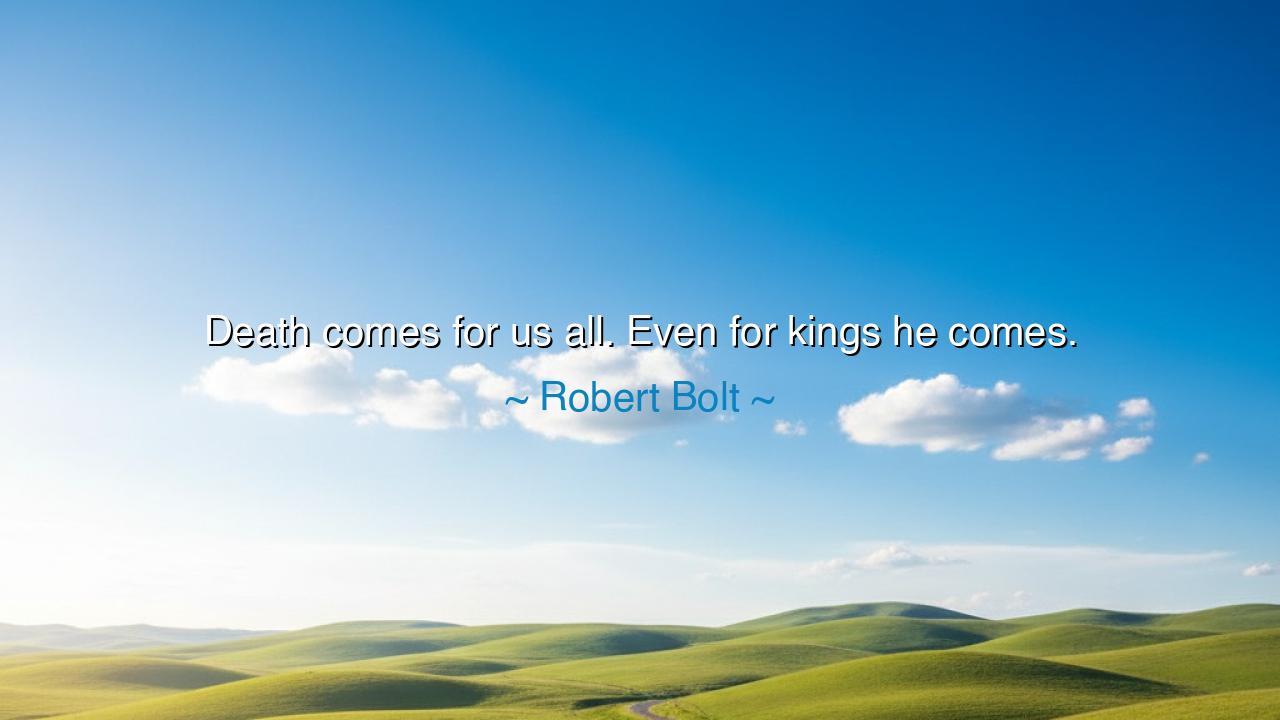
Death comes for us all. Even for kings he comes.






Robert Bolt once wrote: “Death comes for us all. Even for kings he comes.” These words, drawn from his immortal play A Man for All Seasons, are simple in form yet vast in meaning — a truth as old as humanity itself. They remind us that no power, no crown, no triumph can shield us from the universal destiny that awaits every living soul. Death is the great equalizer, the silent judge before whom emperor and beggar alike must kneel. Bolt, through these words, calls upon us to see life not through the eyes of pride or position, but through the eyes of truth — for in the end, all men are measured not by their rank, but by their spirit.
The line is spoken by Sir Thomas More, the noble martyr who defied a king to keep faith with his conscience. When King Henry VIII demanded that More betray his beliefs and recognize his unlawful power, More refused. In doing so, he set himself on a path that would lead to the scaffold. Yet even as the shadow of death fell over him, he did not tremble before it. For he knew what the king himself had forgotten — that death comes even for kings, that no crown can command eternity. Bolt’s More stands as a monument to integrity, a man who faced mortality without fear because his soul was already anchored in truth. Thus, this quote is not a lament of despair, but a declaration of freedom — the freedom that comes from recognizing that all worldly power fades before the final dawn.
Death, in Bolt’s words, is not an enemy to be cursed, but a mirror held before the human heart. It reveals the vanity of earthly things, stripping away the illusion of permanence. The mighty may build their monuments and carve their names in stone, yet time erodes even the strongest marble. The poor may live unnoticed, yet death grants them the same quiet dignity that it grants to kings. The wisdom of Bolt’s line lies in its simplicity: when death comes, it does not ask titles; it asks only, How did you live? Did you live justly, with courage and compassion? Or did you live enslaved to fear, to pride, to the false security of power?
The ancients spoke of this truth often. The Stoics reminded themselves daily of their mortality with the phrase memento mori — “remember that you must die.” They understood that to remember death was not to invite sorrow, but to awaken wisdom. A Roman general returning from victory was whispered this very truth by a slave standing behind him, lest he believe himself divine. Bolt’s line, though written centuries later, carries the same spirit — a warning to those who grow drunk on power, and a comfort to those who fear the mighty. For even kings must bow to death, and in that moment, the throne and the field become one.
History has shown this lesson again and again. Consider the fall of Alexander the Great, who conquered the known world before he reached thirty, only to die young, unable to take a single grain of his empire with him. Or King Louis XVI, whose crown was torn from him by the fury of the people, proving that mortal power is but a fragile illusion. Even the Pharaohs of Egypt, who built pyramids to guard their bodies for eternity, now lie silent beneath the sands — their gold plundered, their names whispered by schoolchildren. All these examples echo Bolt’s truth: death humbles the proud and comforts the oppressed, for it is the one justice that no man can escape.
Yet this truth need not fill us with dread. It can also awaken us to the sacredness of life. If death comes for all, then every moment becomes precious, every act meaningful. To live with the awareness of death is to live with gratitude, to measure time not in years or wealth but in love, courage, and truth. Sir Thomas More, in facing his death, found not despair but peace — for he had lived in harmony with his conscience. He had nothing to fear from the end, for he had never betrayed the eternal within himself. Thus, Bolt’s line teaches that the way to conquer death is not to deny it, but to live so nobly that its coming holds no terror.
Let this be the teaching you carry: fear not death, but fear an unlived life. Do not cling to titles, possessions, or the approval of others, for these are but shadows that fade when the final light falls. Instead, live with integrity; let your words be true, your heart be steadfast, your actions just. Be, as Sir Thomas More was, a soul that no tyrant can corrupt and no fear can silence. For when death comes — and come it will — you will not meet it as a stranger, but as a long-expected friend.
For truly, as Robert Bolt reminds us, death comes for us all — even for kings. And in that final meeting, crowns will crumble, empires will fade, and only the measure of our spirit will remain. Let that truth not darken your days, but illuminate them — for the knowledge of death, rightly understood, is not the end of joy, but the beginning of wisdom.






AAdministratorAdministrator
Welcome, honored guests. Please leave a comment, we will respond soon